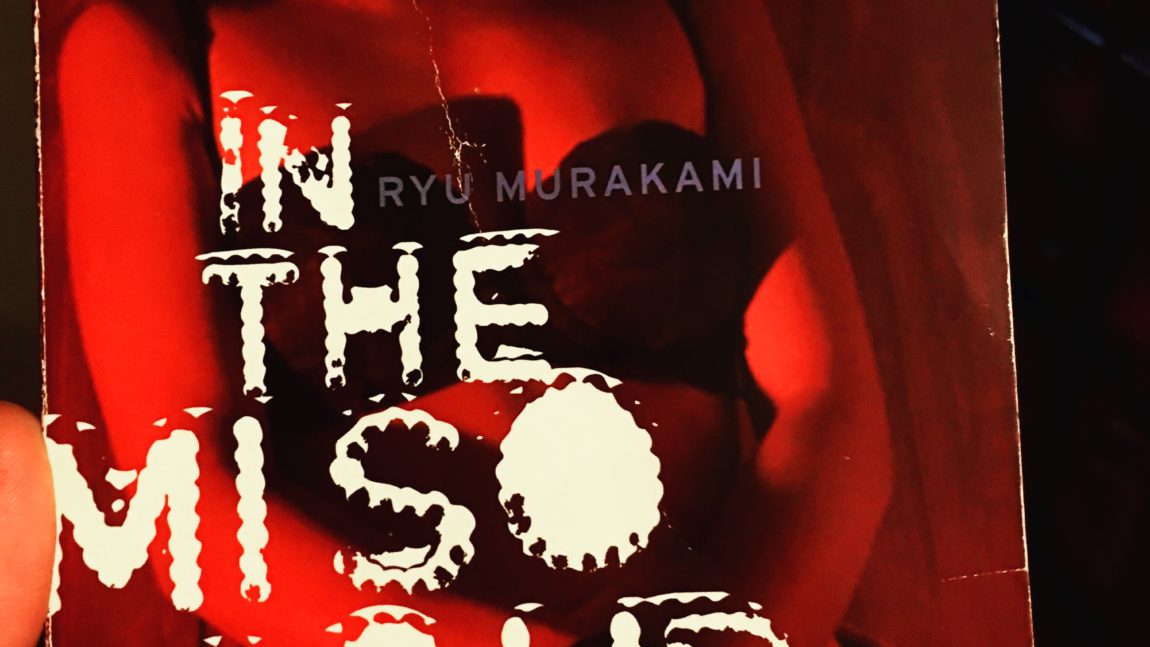In the Miso Soup by Ryu Murakami
This is easily one of the best books I’ve ever read. It’s a bit like Cannery Row meets Silence of the Lambs: a literary tale of two characters’ passage of something meaningful but with some brutal sex and violence as a backdrop.
Just before New Year’s in Tokyo, an overweight American, Frank, hires Kenji to take him on a guided tour of the city’s sex industry. At first, Frank seems just socially awkward. But as his freakish behavior and short temper increase, Kenji begins to suspect that Frank is a serial killer responsible for a string of bizarre killings in the area.
This book could have easily spiraled into a slew of gratuitous sex scenes. It doesn’t. Rather, the author uses the backdrop as a commentary on the clash of East and West civilizations in a postmodern world. Written in the first person, consider comments by Kenji like this:
“It’s not easy to live a normal life. Parents, teachers, government – they all teach you how to live the dreary, deadening life of a slave, but nobody teaches you how to live normally.”
Wow! Kenji (Murakami) serves up a lot of little nuggets like that. While coursing the story through the sex-industry lens, the reader quickly realizes that the background could have been that of any ‘professional’ – lawyer, doctor, politician, professor. They are all just as suspect, just as vile, just as hypocritical.
“The worst possible scenario is always taking shape behind the scenes, where no one can detect it or see it coming, and then one day, boom, it becomes your reality. And once it’s real, it’s too late to do anything about it. That’s what I learned from my father’s death.”
And that’s what Murakami is saying about the outlook of the postmodern generation. This reality, the status of society, wasn’t wanted. It just happened, for no reason, the most difficult part to accept. And bad things happen to Kenji.
Kenji had begun to suspect that Frank was a serial killer. And boy was he right. On one night out, Frank breaks and kills most of the people in a bar, slitting their necks open and mutilating them. (I disclose this particularly to let readers know so they can make informed decisions as to whether or not to read this book.) Although he seemed sheepish and socially awkward at first, Frank’s more of a sociopath at heart. And Kenji, being co-dependent, is easy fodder, like the postmodern generation to a world of hyper-consumerism.
Some reviewers may pooh-pooh this book, claiming that there’s no ‘closure,’ or very little anyway. ‘Where was it all going?!’ one might say. Well … back to Steinbeck. Cannery Row isn’t about the plot, rather, the process. The Grapes of Wrath also ends abruptly enough with no answers. There’s no ‘justice’ served on the wicked. That book was about the journey and so is this one.
As Kenji says, “[M]en who eke out a living exploiting women’s bodies – all have one characteristic in common: the look as if something has eroded away inside of them.” Something has died inside Frank and Kenji alike, even though one is worse than the other. Murakami isn’t simply commenting on the depravity of the sex industry. He’s reflecting on the sad state of affairs at the personal level in this world while using starkly contrasting cultures and a method of prying open hard issues that most people would rather bury away. Consider: “Americans, like Spanish, massacred millions of Indians, but I don’t think it was out of malevolence, so much as plain old ignorance. And sometimes ignorance is harder to deal with than deliberate evil.”
Don’t expect a Dan Brown-like finale any more than you would of Steinbeck. But do expect to be riveted by the writing style and the insights. I couldn’t put this book down. No matter what Kenji was talking about, I just wanted to keep reading, and that is a hard quality to find in books these days.
ALL PAID LINKS #ad




Add Comment